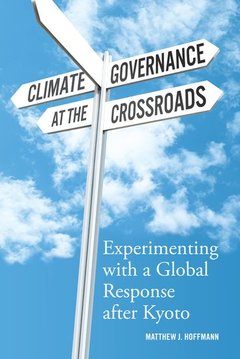Description
Climate Governance at the Crossroads
Experimenting with a Global Response after Kyoto
Author: Hoffmann Matthew J.
Language: English
Subjects for Climate Governance at the Crossroads:
Approximative price 41.30 €
In Print (Delivery period: 21 days).
Add to cart
Climate governance at the crossroads: experimenting with a global response after Kyoto (Paper)
Publication date: 05-2012
240 p. · 15.5x23.4 cm · Paperback
Publication date: 05-2012
240 p. · 15.5x23.4 cm · Paperback
Approximative price 86.50 €
In Print (Delivery period: 21 days).
Add to cart
Climate governance at the crossroads: experimenting with a global response after Kyoto
Publication date: 03-2011
240 p. · 16.3x24 cm · Hardback
Publication date: 03-2011
240 p. · 16.3x24 cm · Hardback
Description
/li>Contents
/li>Biography
/li>
The global governance of climate change is in flux. Conventional strategies of addressing climate change through universal, interstate negotiations--the most prominent of which is the Kyoto Protocol--have been stymied by the gaps that exist between the negotiating powers of states, rendering such initiatives stagnant and ineffectual. In response, a number of new actors and processes have begun to challenge the traditionally exclusive authority of nation-states to create rules and manage environmental problems via multi-national treaties. Dozens of innovative climate response initiatives, or "governance experiments," have emerged at multiple levels of politics and across multiple jurisdictions: individuals, cities, states/provinces, corporations, and even new multilateral initiatives. Climate Governance at the Crossroads explains how and why these new governance experiments have emerged, drawing upon a database of such initiatives to ascertain how these initiatives fit together and how they influence what is defined as environmental governance. In assessing the relational impact of these initiatives (whether they complement each other or clash; whether they can be scaled up or down; and whether they can be expanded beyond their current jurisdictional and geographic boundaries), Matthew Hoffmann provides insight into whether this experimentation is likely to result in an effective response to climate change. Additionally, he draws broader conclusions about how we understand global governance, addressing questions of how we understand authority and what we accept as modes of rule-making in global political spaces.
Chapter 1. Into the Void. Chapter 2. The World of Climate Governance Experimentation. Chapter 3. Making Sense of Climate Governance Experimentation. Chapter 4. Experimenting in Practice. Chapter 5. Experimenting with Cities and Technology. Chapter 6. Constructing Carbon Markets. Chapter 7. Lost in the Void or Filling the Void? Appendix. List of Interviews Undertaken. Works Cited. Index.
Matthew J. Hoffmann is Associate Professor of Political Science at the University of Toronto.
© 2024 LAVOISIER S.A.S.




